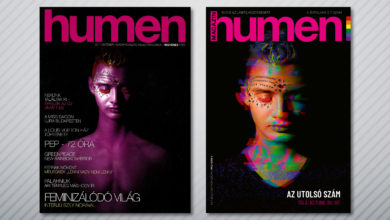„When I don’t express my opinion on something, someone else will do it”

We talked to Viktoria Radványi, President of Budapest Pride, about the need to go out and vote. And much more.
It was wonderful to see how quickly and how focused Budapest Pride reacted to the war in Ukraine. You immediately wrote about who could help, what should be done, where refugees should turn… This is when we can see that Budapest Pride is not only about the LGBTQ community, but you also have a huge sense of social responsibility.
What we experienced as a community that morning, we communicated to the public. We woke up, everyone turned on the news, and we saw that at 5:00 a.m. Russia had attacked Ukraine. And we started talking. About how scared we were, because this war was happening in our neighbourhood. We take care of the Ukrainian people, the Ukrainian LGBTQ people. And we’re afraid of how the government is going to handle this situation, having completely dismantled the refugee system for the last 7-8 years. We knew we had to help those who want to flee Ukraine, but the question is how to do it.
We wanted to draw attention to the fear that what happened in 2015 will happen again, when the Hungarian government adopted a racist, exclusionary attitude towards people fleeing wars, instead of putting humanitarian aid first. We were keen to say that the most important response here is to see the victims of war and help them – each with whatever means one can. But who is organising the donations? Where are the donation points? Who goes to the border? What is needed? Where can these resources be sent? This is the information we have gathered from within the community and published on Facebook. So what Pride was communicating publicly was the end of an internal grappling process about something that we thought wasn’t going to happen.
I, for one, thought that I would not see war in Europe in my adult life. This event shattered our shared vision of Europe and security. We all had the idea that we, here in Central Europe, should not be the victims of war. And let’s think about what would happen if the whole of Ukraine was invaded by Russia? Then the Russians will be at the border. And we also know that in Putin’s case, homophobic politics is very important.
Many LGBTQ people are unaware of the special situation that members of the LGBTQ community find themselves in in Ukraine.
Yes, and Humen Magazine was the first Hungarian media outlet to write an article about what the Washington Post reported: that US intelligence is aware of a list compiled by Russia of people in Ukraine who they want to punish; by torture, by imprisonment in camps or even murder. Anti-corruption activists, journalists and LGBTQ activists. Our partners’ lives are in danger, but we would have assumed that anyway, even without these articles. Also, Humen Magazine wrote that during the pro-European protests in 2014, Russian-paid posters appeared, mainly in densely Russian-populated areas of eastern Ukraine, linking belonging to Europe with the threat of some infiltrating gay propaganda, which they claimed was contrary to Russian traditional family values.
The very same values that our government has now, with a little delay, started to use against the LGBTQ community. Many people have no idea of the murderous homophobia behind the whole system. Some did not even believe that LGBTQ activists could actually be in life-threatening danger. When in fact they are not that far away right now. There is Chechnya, for example.
On the one hand, the mainstream media has a big responsibility for not talking enough about the impact of Putin’s homophobia in Ukraine, Hungary, Poland or the surrounding region. But it also doesn’t talk much about the cooperation between members of the Hungarian government and Russian oligarchs.
And, of course, the impact of Russian disinformation propaganda in Hungarian public life is also noticeable. You yourself said that you saw posts on Facebook saying that Ukraine was never a sovereign state.
On the other hand, there is always a kind of bona fide hope in people. When we hear something about an unimaginable inhumanity, our instinctive reaction is that it can’t happen.
It’s like cancer: everyone says it can’t happen to them, it can only happen to someone else, and then it happens to them. The same is true to some extent of world politics. It affects everybody.
That is why it was very important for us to encourage people to help. I think a fundamental flaw in Hungarian democracy is the lack of a comprehensive human rights approach. This is a serious systemic problem. In these crisis situations, however, it is possible to overwrite previous patterns and reduce the damage that the government’s exclusionary, racist policies have done to the psyche of the Hungarian people.

In recent years, we have experienced some positive disappointments with Hungarian society. They have stood up against the homophobic law, for the storybook ‘Meseország mindenkié’, and there is still tremendous support for the Ukrainian people and refugees. Is the ground more solid under Budapest Pride, so that you know that there is plenty of support in Hungarian society?
The increasing visibility of same-sex couples and transgender people, the increasing availability of information, film series, documentaries, books, theatre performances, cultural products that present minority groups in a nuanced and realistic way, helps a lot.
Éva Antal, the environmental ambassador of our Legyél Te a +1 (Be the plus one) mobilisation campaign, said that she has the impression that Hungarian people basically don’t want to harm the planet, they don’t want animals to suffer, they don’t want to destroy the Earth – they just don’t have the tools to do something about these problems. She sees it as her task to bring these tools to as many people as possible. I feel the same way about human rights issues. I think that in this European Judeo-Christian culture, helping the poor, the fallen, the marginalised, is a value that many people identify with or would like to identify with.
And why do we need right-wing and far-right populism? Why do we need disinformation campaigns? Wars on false pretenses? George Soros conspiracy theories? I think it is because if Viktor Orbán were to simply say that it would not be right for same-sex couples to marry and that we cannot allow it, it would probably not work.
That is why the populist right needs campaigns like this. If you ever do a poll asking the Hungarian people whether people fleeing war or natural disasters should be helped, the majority will say yes. If you ask them whether the illegal immigrants sent here by George Soros should be stopped at the border, the majority will also say yes.
The people are provoked and disturbed by Orbán’s fascist campaigns. But if we turn the conversation back to the real problem, we can see that on the Ukrainian-Hungarian border, too, the first instinctive reaction of people was to get in their cars and collect what the charities in the neighbourhood were asking for and take it to the village where it was needed.
Another thing to consider about LGBTQ rights is that we do not live in a real, well-functioning, healthy plural democracy. The media situation is unhealthily distorted. It is harder to prevail with communication that addresses real issues, and much harder to reach people. Probably, if it were not for this distorted media situation, Viktor Orbán’s government would not be able to deliver the kind of inflammatory messages that it can to some extent. Although I do think that the current anti-LGBTQ narrative is not as effective as the blue poster George Soros anti-migrant campaign of a year ago.
It is even counterproductive, as after the anti-family and homophobic law, the Hungarian media started to consciously write more about the community. And they could not silence us, there is a force in the community that I don’t think was present five years ago.
And a lot of people are speaking out who previously wouldn’t do interviews, wouldn’t come forward with their relationship, their story, because they were afraid of retribution. And of course, there were those who were more afraid of their privilege or wanted to avoid conflicts.
But when it came to one’s life and one’s well-being, many people said, so far and no more, I’m going to go for it, I’m going to tell my story, and I’m going to encourage others. This visibility can cause a marked shift in social attitudes.
It’s important to note that we cannot state unequivocally that Viktor Orbán’s government is the cause of all our problems. Although his policies and the media he controls have caused hellish damage and suffering to the LGBTQ community, it was MSZP that was in government during the Roma murders of 2008, or when far-right groups were beating people up at Pride.
Sure, but by then there was plenty of Fidesz provocation going on, and problems related to the Roma situation are a constant in Hungarian society.
I’m just saying that the other parties need to get their act together, too.
And the media too.
By the way, I don’t think there is an ideology-free media. All editorial staffs have ideas about the world. If an editor has the idea that a journalist should give top priority to the protection of human rights, that is also a position against an editorial team where the voices of racism are raised.
In relation to the media representation of Roma, many independent editorial offices today that prioritise fundamental human rights are criticised for the way they portray the Roma community or their problems. It was a similar situation with the LGBTQ community, until we started shouting in desperation that there was a problem. It was not a priority to show how speeches are made at Budapest Pride, how rich cultural community programming is available at the Budapest Pride Festival, how we support rural activists, what policy demands and critiques we make.
The experience to date is that when we publish material on these issues, no one writes about it. We can only get into the mainstream media if…
…If the house is on fire.
Or if we react to some scandal. It’s hard for human rights defenders to transform themselves into PR people. Saying what we think is urgent is not enough in itself to gain platforms. For example, in the Szájer scandal, we issued a press release with a cheeky title offering to help Fidesz build an LGBTQ-friendly party. In this release we also included important professional positions: we talked about outing, the psychological effects of secretive double lives and the resulting anxiety, the terribly harmful effects of suppressing our sexual orientation, and we hoped that two out of ten newspapers would also print these.
You said that not only has the community become more active, but that people who had not been active before have started to speak up. But I have a big question – or perhaps disappointment – about this. I’ve been trying to recruit influencers for the Legyél Te a +1 campaign, and a lot of people have said they won’t be doing politics or working with Pride. Which is understandable and obviously not a bad thing. But in some cases, I asked myself whether, if LGBTQ people are so politically aware, it’s really a smart decision for an LGBTQ person not to be politically aware.
Opinion leaders, intellectuals, middle- or upper-class people have a responsibility to give voice to issues that an LGBTQ person working as a public worker in a small village near Nyíregyháza cannot voice because they have no tools, no opportunity, no one to listen, and even if they do, their livelihood may be at risk.
But at the same time, we must realize that you, I, our peers, were socialized in a culture where politics was taboo. Let’s not get political at the dinner table. Let’s not talk politics, because that will lead to a debate. As a child, I didn’t know who my parents voted for and on what basis, what they did in the voting booth or which politicians did what, what they promised, what was important to them.
And opinion leaders can also be affected by the fact that when they take a stand on a public policy issue, many people react negatively. “Don’t worry about that, just race cars.” “You just play football; we don’t follow you to hear your thoughts.” “We follow you because we like your songs, we don’t care about your opinion.”
We need a culture shift so that people recognise that politics is about the issues we have in common, and we need to talk about them together. And that requires platforms, arguments, and knowledge.
I think it’s a very damaging process – and not only in Hungary, but in general –that those conflictual debates are often stifled, and we think of an ideal world where there is no debate, friction, or disagreement, because it makes everyone ‘happy. ‘ We must learn to embrace conflict, we must learn that conflict is not necessarily a problem, that a dispute is not necessarily a quarrel, that a difference of interest does not necessarily turn into a bad relationship. And it is not only Hungarian society that has a lot to learn, but also the Anglo-Saxon countries, whose media situation and discourse has an impact on the whole world. We need to get our act together.

I feel that many influencers prefer to use the LGBTQ community as a tool. It’s trendy to focus on cool LGBTQ stuff, while the real issues are dangerous. And speaking of the LGBTQ community as a tool… We can move on to politics, where this is also the case. Many would even say from the opposition side. How can you now work with the united opposition parties?
We do not work with any party. We have an offer to all political actors: we can sit down and talk to them at any time if they are interested in our advice and what problems we see and what solutions we have for them. Fidesz candidates do not usually take advantage of this opportunity.
And other parties?
We’ve had several rounds of meetings with several members of the six-party coalition to raise awareness of the issues that are pressing for the LGBTQ community right now.
And these do not include which Fidesz members are gay, and which are not. My life will not be one percent better if a Fidesz politician is found to be living a double life. It will only increase online hate speech and make opposition party voters feel entitled to write ‘fag’ in the comments.
In this tense situation, there is no such thing as ‘just’ symbolic standing out, and participation in a march can also function as a political message. But I expect every Hungarian political party or party alliance to have its own LGBTQ agenda. It is not enough to say don’t vote for Orbán because he is homophobic and transphobic. What I expect is for a candidate to tell me that they see how much damage Section 33 is causing, how much of a problem it is that transgender people must come out all the time, for example, at a job interview, and how they think this should be remedied. And not just by abolishing Section 33, but by having different institutions build checks and balances in the system or set up service providers that can be called upon. Or show me a candidate who is aware of the problem of Hungary not having a state HIV-AIDS prevention programme and if they can get a mandate, they will table a bill to set up an international HIV centre. Or show us that they find it intolerable that the Hungarian state prohibits same-sex couples from marrying and they want to remedy this.
The civil sector has a lot to offer in this regard. I am well aware that a candidate has to care about five million things. Obviously, not every candidate can know every issue in the same depth: they may have little knowledge of LGBTQ issues, but that is why they need to work with the civil sector – because there is a huge amount of knowledge that is accumulating.
To do this we need to create a political culture and a culture of politicisation in the community. I want parties to compete for the votes of LGBTQ people.
Do you think this could happen in the near future?
Every voter has power. If more and more LGBTQ voters say at public forums or petition drives that they will vote for the candidate who offers the best deal for the LGBTQ community, or if they are asked how their lives can be made better, we will force politicians to have thoughts on the issue. And if they don’t have an LGBTQ agenda, they should write one. That’s why it’s important that the Hungarian LGBTQ community becomes more involved in public life. Because for a very long time we have been an ignored voter group.
The problem is that these goals are seen by the LGBTQ community as a bit black and white. I’ve often seen people say that if there are no equal marriage rights, they won’t even go to the polls.
I can understand that attitude, though, as to why we must wait years, decades for equal rights. We have suffered so much discrimination, so much persecution, so much horror in the past decades and centuries for the LGBTQ community that it is not ok to ask us to be patient. Full legal and social equality is for all people. Period. What makes me angry is when politicians drag their feet a bit on this issue, saying ‘oh, but society is not accepting enough’. In many cases they look down on their own constituents.
And the polls don’t show that either.
Yes, a poll taken two weeks after the propaganda law was introduced put support for equal marriage at 59% in Hungarian society. That is a clear majority.
For the record, I would not be happy about a referendum either. I would not like Auntie Ilonka to decide whether I can marry the person I love or not.
There should not be a referendum on human rights and minority issues. I can think of many minority issues on which a referendum would produce a very, very saddening result.
Democracy is when all people are free to live their lives as long as they do not infringe the freedom of others. Democracy is not about majority rule.
But you have to go to the polls.
You have to go to the polls. If I don’t express my opinion on something, someone else will do it. The election result is not a synthesis of the opinions of all citizens who are entitled to vote, but a synthesis of the opinions of those citizens who did go to the polls. Everyone’s opinion counts. No matter how distorted or dysfunctional the Hungarian electoral system is, we must speak our minds.
Voting as an act is a very important element of participation. But it is only the first step. Let’s go and vote in the parliamentary elections, in the local elections, in the EP elections. But there is a lot to do in between, and that is when the tools are available that can have the greatest impact on politics. When you write to your MP, go to his or her office hours, go to a demonstration, join a letter-writing campaign, sign a petition, do a flash mob. These tools should not only be used when your life or your democracy is at risk.
I don’t think that taking part in an election will change the world, but it is a very good start.
If a Member of Parliament who is theoretically positive on LGBTQ issues is elected, it does not mean that we will never have to address a petition to them or protest outside their office. We might have to. And that’s okay. It just means that citizens know their tools and can use them. If there are a lot of protests in a country, it doesn’t necessarily mean that it’s a bad democracy, it could mean that it’s a very healthy democracy, because citizens take to the streets whenever they are faced with injustice. That is our task. Whatever the outcome of the elections on 3 April, we must represent our interests and get involved in the issues that are most important to us.
And here’s another big news story we haven’t talked about.
It is much easier to talk about others than about myself! There is no one-man leadership at Pride. We have a board that decides by consensus on important strategic issues affecting the organisation. Our organisers and project members are channelled into this, and we have processes in place to ensure that as many people’s views as possible are reflected in the final decision.
However, because of the foundation form, we need to have a chair. Szilvia Nagy was the best-known president of Pride, who died in February 2020, and who was a tremendous role model for me. She had a significant impact not only on Pride, but also on the organisational culture of the Hungarian civil society. After Milán Rózsa’s suicide in 2014, Szilvi also had a great work in developing a Pride community where there are no individual heroes and martyrs, no idealisation of self-destructive overwork. That is why it is an unspeakable honour to be the next President of Pride. I would like to contribute to the preservation of Szilvia’s legacy and to making Pride values as widely known and accessible as possible. Szilvi’s shoes cannot be filled. Rather, they can be admired. That’s what I can do.
But you can fill new shoes.
Of course, I have my own shoes, and they are perfectly good!
Szilvi would probably laugh out loud at that sentence. And she would certainly think that everyone should find their own shoes.
Kanicsár Ádám András
Instagram: @kanicsar
Photographer: István Bielik
Stylist / MUA: Éva Paksi
Clothes: Van Graaf






